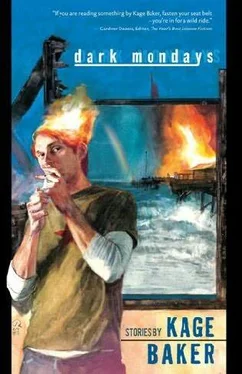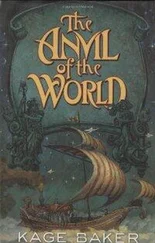* * *
Three hours later John went swaggering up to King’s Wharf where the Mayflower was anchored, carrying a bundle of black doglock muskets over his shoulder as though they were new brooms, and a porter panting after him with his sea-chest and the kegs of powder and shot. Aboard he came, under the gaze of a sour-faced little man with the look of a clerk.
“What’s your business, man?” he said to John.
John tipped the porter, removed his hat and said grandly, “Reporting for duty, sir. As Captain Bradley said I ought, when I spoke to him personal yestereen.”
The clerk took in all that shiny new gear, and his tone was a little more pleasant as he said: “Like enough. Why, then, you must be read in. Step over here, if you please.”
He had a ship’s muster laid out on top of an empty water barrel, with ink and pen to hand. Here he seated himself on a nail-keg, took up the pen and said:
“Your name, sir?”
“John James,” said John, which was half a lie.
“ Very likely,” said the clerk with a sniff, but he wrote it down. “Your age, sir, and place of birth?”
John told him, and they were lies too.
“Able-bodied seaman, yes?”
“Please you, sir, and I’m a gunner,” said John.
“We’ll see about that,” said the clerk. “If the captain rates you so. Herewith the articles: Mariner sails conditionally at Captain Bradley’s pleasure, share to be determined according to worth. Venture to be determined at the Admiral’s pleasure. Terms are, no purchase, no pay.
“Mariner provides his own weapons, amounting to no less than two muskets, two pistols, two cutlasses, and powder and ball sufficient for the endeavor. All weapons to be kept clean and fit for service at all times.
“Mariner shall not steal, nor quarrel, nor murder in the course of quarreling, nor dice, nor game at cards. Default in this at thy peril. Mariner shall not desert or turn coward under fire. Default in this at thy peril. Mariner shall not mutiny or propose venture other than ventures heretofore duly determined by the Admiral. Default in this at thy peril.”
“This is hard straits,” protested John.
“This is Harry Morgan’s way,” said the clerk. “We’re none of your pirates here. You may sign articles or you may go back on the beach, as you please.”
“I was just saying,” said John, but he stood down. The clerk cleared his throat and went on:
“Mariner entitled to free use of any garments taken in the course of venture, for his own proper wear. Mariner entitled likewise to victuals and drink so taken, with daily allotment from the ship’s stores, save upon occasion of short commons, when allotment to be determined at Captain’s pleasure.
“In the matter of recompense for injuries: mariner to receive value of six hundred pieces of eight for loss of either right or left leg. Mariner to receive value of six hundred pieces of eight in recompense for loss of right hand. In recompense for the loss of right hand and left hand, mariner to receive eighteen hundred pieces of eight. In recompense for sight of one eye, mariner to receive one hundred pieces of eight. In recompense for the loss of the sight of both his eyes, mariner to receive six hundred pieces of eight.” John was nodding impatiently by the time the clerk had reached the end of the recitation. The clerk ignored him and read:
“In the matter of recompense for singular bravery, if any man shall distinguish himself under fire, or be first to enter any stronghold under fire, or to lower the Spanish colors and raise those of England: that man shall receive fifty pieces of eight, to be paid directly upon division of spoils and the attestation of witnesses.
“Mariner agrees to all articles herein and signs-or-makes-his-mark,” said the clerk, and offered John the pen and a paper. John signed his first name, started to write his last name, caught himself in time and scratched it out, blotting somewhat, at which the clerk pursed his lips. John hurriedly wrote JAMES after and underscored it with a flourish, and the clerk shook sand on the lot, and that was that.
* * *
The Mayflower sailed with the rest of the fleet on the day, certain as clockwork, following Morgan in the Satisfaction . Yet they went no further than up the coast a little to Blewfield’s Bay, there to put the ships in trim and take on stores and water. John heard mutterings that Morgan wanted to avoid losing his crews to the entertainments of Port Royal, nor have them talk overmuch while ashore.
“Not that any one of us knows enough where we’re bound to tell,” said the old man with whom John had been set to work. They stood in the shadow of the Mayflower’s hull, vast above them as a dead whale, while they smashed and chipped off barnacles.
“Well, we can’t be going out for Portobelo again, can we?” said John. “That well’s dry. And it won’t be Maracaibo again, neither.”
“I hear it’s to be Vera Cruz,” said the old man dreamily, descending his ladder. He moved it over a pace and squinted upward. “Or Santiago de Cuba, the which I hope is wrong. That’s a hard place to take. Unless rumor’s true and Prince Rupert comes along with us. They say he could crack a fortress like a nut.”
“Prince Rupert?” John turned, staring through the salt sweat that trickled down. He mopped his face with a rag. “What’s he?”
“Only the king’s kinsman,” said the old man. “Fought for the old king against the Roundheads, you know. When they won, Prince Rupert took to sea and privateered. They say he was a right devil! I never sailed with him; but they do say he took Cromwell’s ships along with the Spanish, never mind whose blood he shed. I heard he had a familiar spirit like a dog, that sniffed out treasure fleets for him.
“They say he came out here to try what he could get in the way of good fortune; but I reckon he lost his dog, for half his fleet went down in a storm, and his own brother with it. Gave it up for a bad job and sailed home again.”
“He’d be old now, though, wouldn’t he?” said John. The other man winced.
“That was only in ’52,” he said defensively. “Not so long ago as all that! He was a young devil then; he’d be a prime cunning devil now, you mark me.”
“Aye, but—” said John.
“He was burning Spanish ships when you was puking on your nurse,” said the old man, and dug with particular vehemence at a knotted gob of weed and shell. John shrugged and held his tongue.
However good a privateer he might have been, no Prince Rupert came out of retirement to join them, when they’d all refitted and sailed off to Tortuga. Still it was a great host of the Brethren, French and English, that met with Morgan in the lee of Cape Tiburon. Morgan played the lord, with his brother captains sipping rum aboard his flagship, the great Satisfaction .
Things weren’t nearly so grand for John.
He was learning that he needn’t have hurried so to get aboard the Mayflower , she had plenty of berths free, for it turned out that Captain Bradley was no great shakes as a privateer. He had a reputation for being, you might say, unenterprising. No sooner had the Mayflower put in at Cape Tiburon than half its crew was over the side under cover of darkness, signing on with other captains. John would have deserted, himself, but that Bradley offered him position as chief gunner at three whole shares to stay.
Worse, Bradley discovered John could read and write, and so offered him a fourth share to serve as mate to the pinch-faced purser, Felham. It was surely a better bargain than serving as a plain hand before the mast; and John’s mother started up her doleful crying in his head, and told him all about the respectable little shop he might set up in, if he made his pile on this expedition. So John stayed on, to his regret.
Читать дальше












